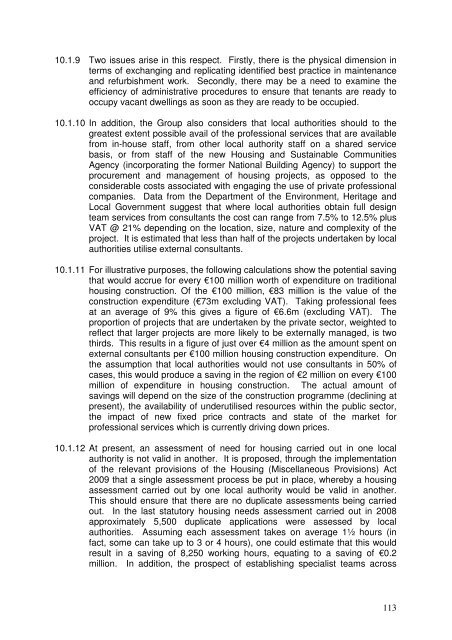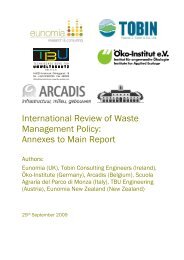Report of the Local Government Efficiency Review Group
Report of the Local Government Efficiency Review Group
Report of the Local Government Efficiency Review Group
You also want an ePaper? Increase the reach of your titles
YUMPU automatically turns print PDFs into web optimized ePapers that Google loves.
10.1.9 Two issues arise in this respect. Firstly, <strong>the</strong>re is <strong>the</strong> physical dimension in<br />
terms <strong>of</strong> exchanging and replicating identified best practice in maintenance<br />
and refurbishment work. Secondly, <strong>the</strong>re may be a need to examine <strong>the</strong><br />
efficiency <strong>of</strong> administrative procedures to ensure that tenants are ready to<br />
occupy vacant dwellings as soon as <strong>the</strong>y are ready to be occupied.<br />
10.1.10 In addition, <strong>the</strong> <strong>Group</strong> also considers that local authorities should to <strong>the</strong><br />
greatest extent possible avail <strong>of</strong> <strong>the</strong> pr<strong>of</strong>essional services that are available<br />
from in-house staff, from o<strong>the</strong>r local authority staff on a shared service<br />
basis, or from staff <strong>of</strong> <strong>the</strong> new Housing and Sustainable Communities<br />
Agency (incorporating <strong>the</strong> former National Building Agency) to support <strong>the</strong><br />
procurement and management <strong>of</strong> housing projects, as opposed to <strong>the</strong><br />
considerable costs associated with engaging <strong>the</strong> use <strong>of</strong> private pr<strong>of</strong>essional<br />
companies. Data from <strong>the</strong> Department <strong>of</strong> <strong>the</strong> Environment, Heritage and<br />
<strong>Local</strong> <strong>Government</strong> suggest that where local authorities obtain full design<br />
team services from consultants <strong>the</strong> cost can range from 7.5% to 12.5% plus<br />
VAT @ 21% depending on <strong>the</strong> location, size, nature and complexity <strong>of</strong> <strong>the</strong><br />
project. It is estimated that less than half <strong>of</strong> <strong>the</strong> projects undertaken by local<br />
authorities utilise external consultants.<br />
10.1.11 For illustrative purposes, <strong>the</strong> following calculations show <strong>the</strong> potential saving<br />
that would accrue for every €100 million worth <strong>of</strong> expenditure on traditional<br />
housing construction. Of <strong>the</strong> €100 million, €83 million is <strong>the</strong> value <strong>of</strong> <strong>the</strong><br />
construction expenditure (€73m excluding VAT). Taking pr<strong>of</strong>essional fees<br />
at an average <strong>of</strong> 9% this gives a figure <strong>of</strong> €6.6m (excluding VAT). The<br />
proportion <strong>of</strong> projects that are undertaken by <strong>the</strong> private sector, weighted to<br />
reflect that larger projects are more likely to be externally managed, is two<br />
thirds. This results in a figure <strong>of</strong> just over €4 million as <strong>the</strong> amount spent on<br />
external consultants per €100 million housing construction expenditure. On<br />
<strong>the</strong> assumption that local authorities would not use consultants in 50% <strong>of</strong><br />
cases, this would produce a saving in <strong>the</strong> region <strong>of</strong> €2 million on every €100<br />
million <strong>of</strong> expenditure in housing construction. The actual amount <strong>of</strong><br />
savings will depend on <strong>the</strong> size <strong>of</strong> <strong>the</strong> construction programme (declining at<br />
present), <strong>the</strong> availability <strong>of</strong> underutilised resources within <strong>the</strong> public sector,<br />
<strong>the</strong> impact <strong>of</strong> new fixed price contracts and state <strong>of</strong> <strong>the</strong> market for<br />
pr<strong>of</strong>essional services which is currently driving down prices.<br />
10.1.12 At present, an assessment <strong>of</strong> need for housing carried out in one local<br />
authority is not valid in ano<strong>the</strong>r. It is proposed, through <strong>the</strong> implementation<br />
<strong>of</strong> <strong>the</strong> relevant provisions <strong>of</strong> <strong>the</strong> Housing (Miscellaneous Provisions) Act<br />
2009 that a single assessment process be put in place, whereby a housing<br />
assessment carried out by one local authority would be valid in ano<strong>the</strong>r.<br />
This should ensure that <strong>the</strong>re are no duplicate assessments being carried<br />
out. In <strong>the</strong> last statutory housing needs assessment carried out in 2008<br />
approximately 5,500 duplicate applications were assessed by local<br />
authorities. Assuming each assessment takes on average 1½ hours (in<br />
fact, some can take up to 3 or 4 hours), one could estimate that this would<br />
result in a saving <strong>of</strong> 8,250 working hours, equating to a saving <strong>of</strong> €0.2<br />
million. In addition, <strong>the</strong> prospect <strong>of</strong> establishing specialist teams across<br />
113
















